m (internal link cleaning) |
|||
| (38 intermediate revisions by 2 users not shown) | |||
| Line 3: | Line 3: | ||
= Introduction = | = Introduction = | ||
[[Image: | [[Image:Gnome-nmarques.png|thumb|GNOME 2.30.0 in Fedora 13 "Goddard"]] | ||
The [http://www.gnome.org GNOME] project was started in 1997 by Miguel de Icaza and Federico Mena Quintero aiming to provide a swift answer to Windows 95. By this time the KDE project was also on the move, but it required the installation of the QT library which didn't provided a free licence in those days. | |||
GNOME positioned itself by redefining simplicity and usability and promoting it's goals: | |||
* Freedom - by providing a free Desktop Environment available in binary and source. By providing it's users freedom to change the source to their personal needs and share with the community. | |||
* Accessibility - to ensure that any person can use GNOME regardless of their technical skills or deficiencies. | |||
* Internationalization - providing GNOME currently in over than 160 languages. | |||
* Ease of Development - providing developers a good framework that provides good integration and allowing them to use their tools of choice for development. | |||
* Organization - providing a disciplined structure and management over the release cycles. | |||
* Support - ensuring support to numerous organizations outside GNOME. | |||
The GNOME Project is currently under supervision of the [http://foundation.gnome.org GNOME Foundation] which represents the project to organizations, corporations and society as a whole. | |||
GNOME is currently developed by volunteers and hired professionals which work for companies like [http://www.ibm.com IBM], [http://www.redhat.com Red Hat Inc.], [http://www.novell.com Novell], et al. GNOME sponsor list can be consulted on the [http://foundation.gnome.org/ GNOME Foundation] web page. | |||
GNOME is a fine example of prime FOSS Engineering and better understood under "[http://catb.org/esr/writings/homesteading/ The Cathedral and Bazaar]" model. | |||
[http:// | [http://library.gnome.org/misc/release-notes/2.30/ GNOME 2.30.0] is available since the $DATE and presents a whole new set of features and extra functionality; from new users to to advanced users, GNOME will make everyone's delights with a promiss of stability, ease of use and simplicity. | ||
GNOME is currently available in all mainstream Linux Distributions and a vast number of spins. | |||
= GNOME | = GNOME 2.30.0 = | ||
GNOME provides users with an exciting experience to perform their computing tasks. From communicating with friends to work development, GNOME provides a very flexible [http://en.wikipedia.org/wiki/Desktop_environment Desktop Environment] and a set of applications to fulfil their needs. | |||
[http://library.gnome.org/misc/release-notes/2.30/ GNOME 2.30.0] brings into play some changes to make users life easier, alongside with new exciting features and functionality. | |||
One of the most awaited features in GNOME that will make many users delights is delivered by Nautilus, GNOME's File Manager. Nautilus 2.30.0 introduces a new split mode view (by pressing F3); this feature allows the user to have a far greater control over every days file system tasks, such as copying files. Nautilus 2.30.0 also comes pre-configured in browser mode, providing a more spatial control to the user. | |||
[[Image:Nautilus-nmarques.png|center|500px|Nautilus 2.30.0]] | |||
Another exciting new feature in GNOME 2.30.0 is the new [http://projects.gnome.org/gnome-color-manager/ GNOME Color Manager] application that will make the delights of every photographer and artist, if not everyone's delights. | |||
[[Image:GCM-nmarques.png|center|500px|GNOME Color Manager 2.30.0]] | |||
[[Image: | |||
Networking in Linux has evolved a lot, and GNOME provides a nice applet (nm-applet) for [http://projects.gnome.org/NetworkManager/ NetworkManager], which was initiated by [http://www.redhat.com Red Hat Inc.] in 2005 and currently maintained by Dan Williams. NetworkManager through nm-applet deploys easy networking to GNOME users; with 2.30.0 it comes with a new design and extra functionality: | |||
* Bluetooth DUN | |||
* Broadband Signal Status | |||
* DHCPv6. | |||
The Fedora Marketing Team provided the community with a [[NetworkManager_in_Fedora_13|very interesting article]] about NetworkManager in GNOME 2.30.0 featuring and interview with Dan Williams. | |||
[[Image:ORCA.png|right|ORCA]] | |||
GNOME 2.30.0 also ships with [http://live.gnome.org/Orca ORCA], an open source scriptable screen reader which uses various combinations of speech, braille and magnification. The development of Orca has been led by the Accessibility Program Office of [http://www.sun.com Sun Microsystems Inc.] with contributions from many community members. | |||
ORCA is one of GNOME's promises in therms of providing accessibility to it's Desktop Environment, enabling many people to use a computer that otherwise wouldn't be able to. | |||
Another package that brings extended functionality with GNOME 2.30.0 is [http://projects.gnome.org/brasero/ Brasero], GNOME's CD/DVD burning software; in this release, Brasero presents GNOME users with PackageKit integration, improved Audio CD creating through the cdda2wave plugin and supports searches using Tracker. Brasero is currently one of the most popular CD Burning applications used in Linux. | |||
[[Image:Brasero-nmarques.png|center|500px|Brasero 2.30.0]] | |||
= Testimonials = | = Testimonials = | ||
| Line 70: | Line 57: | ||
{{Quote|A ideal environment is one which stays out of the way and lets me get the work done. GNOME strives to do just that and has made remarkable strikes towards putting the user first instead of technology for the sake of technology. The best thing I can say about GNOME is that I never have to think about it anymore.|[[User:Sundaram|Rahul Sundaram]], Fedora Developer}} | {{Quote|A ideal environment is one which stays out of the way and lets me get the work done. GNOME strives to do just that and has made remarkable strikes towards putting the user first instead of technology for the sake of technology. The best thing I can say about GNOME is that I never have to think about it anymore.|[[User:Sundaram|Rahul Sundaram]], Fedora Developer}} | ||
{{Quote|For work I use GNOME because I usualy have there Redhat Enterprse Installations up and running, so the prefered Windowmanager for private is also Gnome. I like the fully integration and the smooth switching between work and "home" area.|[[User:wonderer|Henrik Heigl]], Fedora Ambassador and Fedora Marketing Team}} | |||
= References = | |||
* [http://ekiga.org/ Ekiga] | |||
* [http://live.gnome.org/Empathy Empathy] | |||
* [http://projects.gnome.org/evolution/ Evolution] | |||
* [http://www.fedoraproject.org Fedora Project] | |||
* [http://foundation.gnome.org GNOME Foundation] | |||
* [http://www.gnome.org GNOME Project] | |||
* [http://www.redhat.com Red Hat Inc.] | |||
* [http://www.xchat.org X-Chat] | |||
Latest revision as of 20:57, 19 September 2016
Introduction
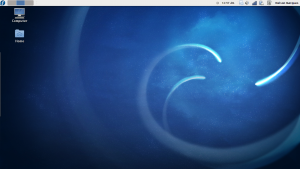
The GNOME project was started in 1997 by Miguel de Icaza and Federico Mena Quintero aiming to provide a swift answer to Windows 95. By this time the KDE project was also on the move, but it required the installation of the QT library which didn't provided a free licence in those days.
GNOME positioned itself by redefining simplicity and usability and promoting it's goals:
- Freedom - by providing a free Desktop Environment available in binary and source. By providing it's users freedom to change the source to their personal needs and share with the community.
- Accessibility - to ensure that any person can use GNOME regardless of their technical skills or deficiencies.
- Internationalization - providing GNOME currently in over than 160 languages.
- Ease of Development - providing developers a good framework that provides good integration and allowing them to use their tools of choice for development.
- Organization - providing a disciplined structure and management over the release cycles.
- Support - ensuring support to numerous organizations outside GNOME.
The GNOME Project is currently under supervision of the GNOME Foundation which represents the project to organizations, corporations and society as a whole. GNOME is currently developed by volunteers and hired professionals which work for companies like IBM, Red Hat Inc., Novell, et al. GNOME sponsor list can be consulted on the GNOME Foundation web page. GNOME is a fine example of prime FOSS Engineering and better understood under "The Cathedral and Bazaar" model.
GNOME 2.30.0 is available since the $DATE and presents a whole new set of features and extra functionality; from new users to to advanced users, GNOME will make everyone's delights with a promiss of stability, ease of use and simplicity. GNOME is currently available in all mainstream Linux Distributions and a vast number of spins.
GNOME 2.30.0
GNOME provides users with an exciting experience to perform their computing tasks. From communicating with friends to work development, GNOME provides a very flexible Desktop Environment and a set of applications to fulfil their needs. GNOME 2.30.0 brings into play some changes to make users life easier, alongside with new exciting features and functionality.
One of the most awaited features in GNOME that will make many users delights is delivered by Nautilus, GNOME's File Manager. Nautilus 2.30.0 introduces a new split mode view (by pressing F3); this feature allows the user to have a far greater control over every days file system tasks, such as copying files. Nautilus 2.30.0 also comes pre-configured in browser mode, providing a more spatial control to the user.
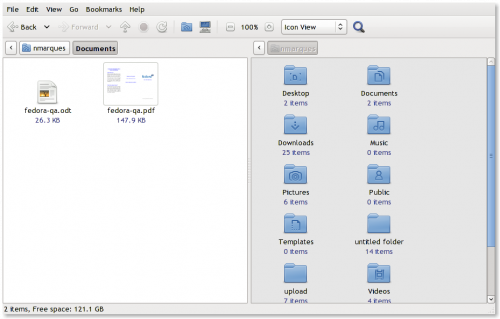
Another exciting new feature in GNOME 2.30.0 is the new GNOME Color Manager application that will make the delights of every photographer and artist, if not everyone's delights.
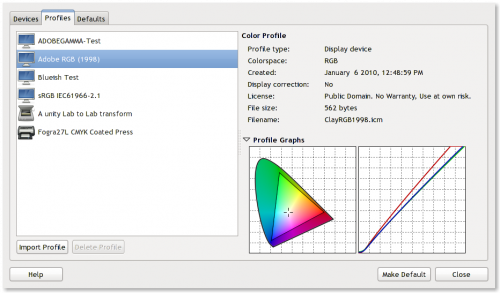
Networking in Linux has evolved a lot, and GNOME provides a nice applet (nm-applet) for NetworkManager, which was initiated by Red Hat Inc. in 2005 and currently maintained by Dan Williams. NetworkManager through nm-applet deploys easy networking to GNOME users; with 2.30.0 it comes with a new design and extra functionality:
- Bluetooth DUN
- Broadband Signal Status
- DHCPv6.
The Fedora Marketing Team provided the community with a very interesting article about NetworkManager in GNOME 2.30.0 featuring and interview with Dan Williams.
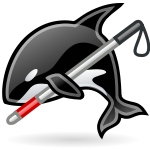
GNOME 2.30.0 also ships with ORCA, an open source scriptable screen reader which uses various combinations of speech, braille and magnification. The development of Orca has been led by the Accessibility Program Office of Sun Microsystems Inc. with contributions from many community members. ORCA is one of GNOME's promises in therms of providing accessibility to it's Desktop Environment, enabling many people to use a computer that otherwise wouldn't be able to.
Another package that brings extended functionality with GNOME 2.30.0 is Brasero, GNOME's CD/DVD burning software; in this release, Brasero presents GNOME users with PackageKit integration, improved Audio CD creating through the cdda2wave plugin and supports searches using Tracker. Brasero is currently one of the most popular CD Burning applications used in Linux.
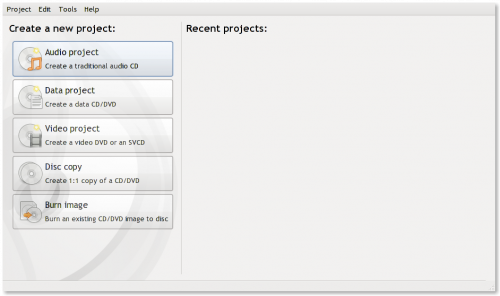
Testimonials
Neville A. Cross, Fedora Marketing Team |
Nelson Marques, Fedora Marketing Team |
Rahul Sundaram, Fedora Developer |
Henrik Heigl, Fedora Ambassador and Fedora Marketing Team |

